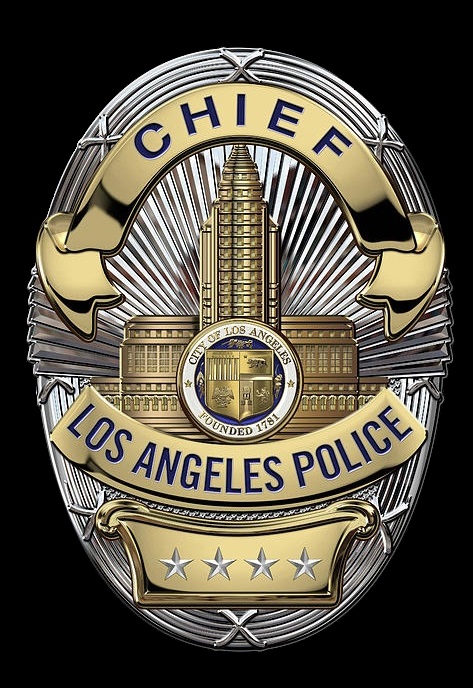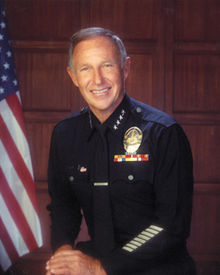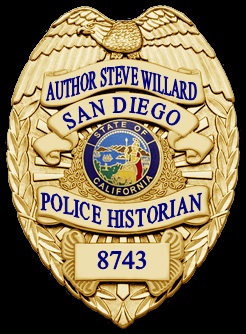



Historians often credit Inspector Gates with the idea of a S.W.A.T. team as a result of the 1965 Watts riots but Gates had made it clear all along, he merely approved the concept of a “Special Weapons Attack Team” after it was brought to him by Officer John Nelson. The name was later modified to “Special Weapons and Tactics Team.”
When Chief Ed Davis announced his retirement in March of 1978, Gates was a three star assistant chief and quickly applied for the job. Like every other time in his career, he scored number one. Under Civil Service rules that would generally mean Gates would be chief. However, a retired LAPD lieutenant who was now the sitting mayor, Tom Bradley, did what he could to derail the promotion. In the end it was not enough and Gates was made after a unanimous police commission approval.
The honeymoon was short. Proposition 13 had just been approved and overnight the city of L.A. was poised on the verge of bankruptcy. Faced with hundreds of LAPD layoffs, Gates implored the council to avoid the cuts. When they were slow to respond, he personally contacted the Houston Police Department and arranged for them to hire any officer that lost their job. When Gates told the council what he had done. They quickly found funding.
By 1983 civilianization had sent more than 1,300 cops back to the field. By 1984, attrition had pushed the numbers of authorized sworn personnel down to 6,900; a drop of almost 3,000 officers from just a decade before.
By 1988 Gates classified the two biggest problems facing LAPD as narcotics trafficking and street gang violence. Things had obviously changed. Just a few years earlier he told a Times reporter, “I don’t worry about gangs, I run the largest gang in town.”
To fight drugs Gates created the Drug Abuse Resistance Education (DARE) program. To combat dealers in fortified homes, he approved the use of a modified military vehicle with a battering ram attached to the front. While the ram proved to be efficient, it was a PR nightmare for a police department already viewed in some parts of the city as an occupying army.
Never one to hold his lip, Gates was as famous for his quips as any of his professional accomplishments. In 1982, an L.A. Times reporter questioned why, in seven years, 12 black people had died in LAPD chokeholds. The paper quoted Gates to say “blacks might be more likely to die from chokeholds because their arteries do not open as fast as they do on 'normal people’.” The Chief later said it was a misquote but the media had a field day. It didn’t help when even some L.A. cops began calling their patrol cars, “black and normals.”
In 1990 Gates told Senate Judiciary Committee chairman, and future president, Joe Biden that casual drug users, "ought to be taken out and shot." When asked about his son Scott’s drug history, Gates answered, “Scott didn’t need to be shot, drugs already did it for him.”
Retired Detective Sergeant Dick Kalk described Gates by saying, “if an officer made a mistake but was honest about it Gates would back you to the hilt. If the officer was engaged in something illegal, discipline would be quick and harsh.”
Detective Tom Lange of O.J. Simpson fame, recalled, “Gates lead with a no nonsense, common sense approach. You might not have liked what he said but if you didn’t respect it you were a fool.”
In the end it was nothing Gates said that led to his downfall. Things had begun to unravel after the March 3, 1991, videotaped beating of Rodney King. The subsequent acquittal of the four officers created immediate tensions but then came a televised meeting with leaders of the First AME church where Mayor Tom Bradley could be seen pounding a podium encouraging people to take to the streets. For many thugs it was all they needed. Only four violent crimes had been reported in South Central in the hour before the mayor’s comments. An hour later 28 had been reported and more were coming in by the minute.
The riot made LAPD appear flatfooted and slow to respond. Was it all Gates fault? Probably not. He had asked for 1,000 officers to be placed on overtime when the verdicts were read. His request was not only denied, the chief was castigated for suggesting it was even necessary.
With more than a billion dollars in property damage and 53 people dead, the riots marked the final blow to Gates 43 year career. Faced with mounting pressure, the Chief officially retired on June 27, 1992.
L.A. Times staff writer Sheryl Stolberg asked Gates how he thought history would view his tenure. "I think history will take care of itself," he said.
If troop loyalty was any indicator, history was very kind. Even after a decade in retirement Gates would routinely command a standing ovation at LAPD events.
When Chief Bernard C. Parks was denied a second term in 2002, a 75-year-old Gates told CNN he intended to apply for his old job. The media ridiculed the announcement as a publicity stunt and the police commission appointed former NYPD Commissioner William J. Bratton as the new chief.
As recently as September of 2009, I had the opportunity to spend time with Daryl Gates. I couldn’t help but note if it weren’t for a hearing aid, he looked as though he could still finish in the top five in an LAPD academy. So it was with great shock I found out he was severely ill. It was with even greater sadness when I learned he died. RIP in peace Daryl Gates. You’ll be missed.

THE PASSING OF DARYL GATES
Law enforcement lost a venerable giant on April 16, 2010, when Daryl Gates died of liver cancer at the age of 83. Most people knew him simply as “The Chief.” But, behind the luster of a silver and gold shield made famous by TV shows such as Dragnet, is a story of a man who stumbled into police work only to become one of the most famous cops in the world.
Daryl Francis Gates was born August 30, 1926. His family moved frequently during the Great Depression after his father lost his business and became a heavy drinker. Gates later confessed that he never held any ambition to become a policeman. In fact, when he was 16 he was arrested for punching an officer after he was detained for double parking.
Like most boys in 1943, immediately after high school Gates joined the military to fight in WWII.
As the 40’s drew to a close, Gates was married and driving trucks. One day a friend suggested a job in law enforcement. Gates later recalled his first reaction was, “I don’t want to be a dumb cop” but, with a baby on the way, the pay was too good to pass up. In 1949 he was sworn in but deep down he only considered it a temporary job; his real ambition was to go to law school.
In 1952 Gates was assigned as the driver for Chief William H. Parker. He later recalled his first day as a complete disaster. Assigned to drive Parker home in a brand new Buick, Gates opened the door for his boss then slid in behind the wheel and began looking for the shifter. Then he began to panic. Parker leaned forward and asked, “you’ve never driven an automatic have you?” When Gates answered “no” Parker ordered him in the backseat while he drove. That evening Gates told his wife it was his first and last day as the chief’s driver. Obviously it was not. Gates later recounted that he gained many professional insights from Parker during the hours they spent together.
Gates worked hard to prepare for promotional exams and scored first on every one he took. When he made lieutenant he rejoined Parker as his executive officer.


